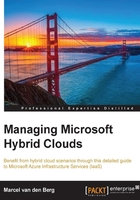
Dedicated versus private virtual clouds
Cloud service providers sometimes offer their customers two options in their IaaS offering:
- A dedicated, private cloud
- A shared cloud
Private cloud hosting or dedicated cloud means the virtualization host machines exclusively run virtual machines of a single tenant, and there is physical isolation at the compute level. Storage, networking, and other components are mostly logical, isolated using virtual LAN and virtual storage features. Without logical isolation, this will be a very expensive kind of cloud.
The advantage of this kind of cloud is on security and performance. Some organizations do not want shared processing by multiple tenants. They believe there is a risk other tenants might be able to look into virtual machines of other tenants. Another aspect is performance.
The third possible reason for using a dedicated cloud is compliance requirements regarding licensing. Some vendors believe their customers need to license the number of CPU sockets that a virtual machine can possibly run on. When using a dedicated cloud, the potential number of CPUs is restricted and is easy to count in a license assessment.
In shared cloud processing, resources are shared between multiple tenants. This makes this offer cheaper than a dedicated cloud. Virtual machines of multiple tenants are processes on the same host. Tenants do not have any control over where their virtual machines are running.
Microsoft Azure does not offer a private/dedicated cloud. Compute, network, and storage resources are logically isolated. So, virtual machines of multiple tenants will share the same Azure host.